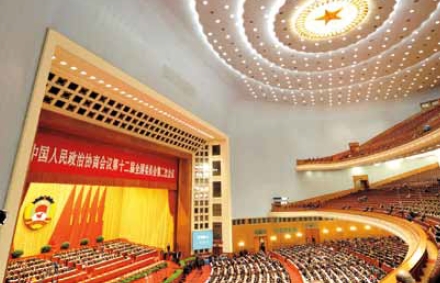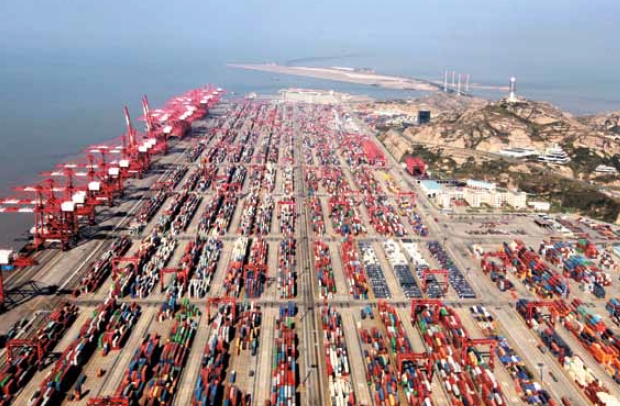|

Annual session of CPPCC National Committee
The Second Session of the 12th National People’s Congress (NPC) passed the Report on the Work of the Government by Premier Li Keqiang on March 13. The report, delivered on March 5, the opening day of this year’s annual NPC session, mentions the word “reform”77 times and the measures proposed by the report encompass the sectors of the economy, politics, people’s well-being, rule of law and ecological progress.
This is the first report on the work of the government by Premier Li. All of the 60 detailed reform tasks proposed by the Decision of the Central Committee of the Communist Party of China (CPC) on Some Major Issues Concerning Comprehensively Deepening the Reform adopted last year are included in this report. Moreover, on issues of taxation, finance, pollution control, urbanization, medical reform and education, the report puts forward even more detailed guidelines.
Zhao Xijun, Vice Dean of the School of Finance of Renmin University of China, said the report indicates that the Chinese Government is implementing the blueprint of reform formulated by the Third Plenary Session of the 18th CPC Central Committee last November, and it has enough determination and confidence to effectively implement the blueprint.
China’s measures of comprehensive reform are also good news for the world economy. Because the fortunes of the Chinese economy are so indelibly linked with those of the global economy, sound economic and social development inChinawill bring opportunities to the wider world.
High expectations
Zhao said that according to the Report on the Work of the Government, reform measures among the nine key aspects of government work can be grouped into three categories. Those pertaining to the economy include streamlining administration and delegating power to lower levels, tax reform, financial reform and accelerating economic transformation. Those relating to social development and management include advancing urbanization, improving people’s well-being and reforming the household registration system. Finally, reform in ecological progress comprises measures for advancing the transformation of energy production and consumption.
Reform is the primary theme of the government’s work this year, with economic reform in particular labeled the paramount task. In contrast to bygone years, this year’s reforms will mainly tackle the difficulties that, up to now, have not been addressed. For example, last year, the government reduced the number of items subject to government review and approval, and this year the government may work on some more contentious items. According to the report, the government will introduce a system to list all items over which government review and approval are required, with an aim to make the government administration more transparent.Chinawill also refashion its business registration system nationwide and carry out registration of subscribed capital. In addition, annual inspections of businesses will be replaced by annual reporting. For the government, this is a self-imposed revolution with the aim of incentivizing potential market participants.
Another area of difficulty is fiscal and tax reform. Zhao said reform of the fiscal and tax system basically involves how much the government will take, how much the market will reserve and how much residents can get. With regard to the government itself, it also involves how much fiscal revenue is allocated to the Central Government and how much goes to local governments. It is a reform of the fiscal and tax system, but in fact it involves relationships between interests in the government, the market and among the common people. It also involves relationships among various interests within the Central Government and various local governments. Therefore, navigating through this jungle of conflicting interests and attitudes in order to blaze a path to clear solutions will be a very difficult and challenging task.
Zhao said that it can be expected the commitments to financial reform laid out by the report will be honored. Owing to factors such as shadow banking and local government debt risks, the academic circle has been questioning the overall health of the Chinese financial industry. The report vows to deepen reform of the financial sector, including measures such as continuing to liberalize interest rates.
The public is also concerned about reforms of ownership. Premier Li’s report vows to formulate measures for non-state capital to participate in investment projects of enterprises under the Central Government, and allow non-state capital to take on a number of projects in areas such as banking, oil, electricity, railway, telecommunications, resources development and public utilities. The government will formulate specific measures to permit private enterprise participation in franchising, to reform the railway investment and financing system, and to open competitive operations in more areas so as to create a platform for the full participation of private capital.
Zhao continued that althoughChinahas announced the introduction of many measures to support development of the non-state economy, the “glass door” for private capital to enter state-owned monopoly industries has not yet been broken through. This year the government will take larger strides in this regard.

The Shanghai Free Trade Zone

Liu Jing, a pharmacist at Qinghai Red Cross Hospital, picks up medicine for patients. Deepening medical reform is a vital part of the government work in 2014
Big resistance
“It is not easy to implement these reform measures,” said Yang Weimin, deputy head of the Office of the Central Leading Group on Finance and Economic Affairs. “The biggest resistance not only lies in the difficulty and complexity inherent in the reform measures themselves, but also comes from vested interest groups.”
According to Yang, after 36 years of development, the benefits of the previous round of reforms have been almost exhausted. Facing problems, old and new, and demands from interests in all areas, the process of implementing reforms for the future is becoming increasingly difficult. From Premier Li’s report, people will find that implementation of reform measures has touched a nerve among vested interest groups. To carry out reform measures,Chinamust therefore break through the obstacles presented by mental shackles and vested interests.
The report echoes the decision by last year’s CPC plenary session that steps be taken to “make the market play a decisive role in resource allocation.” This year,Chinawill cancel or delegate to lower-level governments an additional 200-plus items previously subject to central government review and approval, items over which many government departments are reluctant to lose control.
At a press conference held on March 6, Li Yining, a member of the National Committee of the Chinese People’s Political Consultative Conference (CPPCC) and a renowned economist, expressed his concerns regarding resistance to reform.
Li said today’s situation for reform is different from three decades ago, because the problems that most need to be addressed represent thorny issues. The resistance to reform comes mainly from two areas. First and foremost are the interest groups, as reform will damage their interests. The second source is a feature of human nature, namely, people’s innate resistance to change. Having become accustomed to one way of doing something and having grown to rely on that system, people tend to be loath to try alternative methods.
While meeting the press on March 8, Chi Fulin, a CPPCC National Committee member and President of the Hainan-based China Institute for Reform and Development, said that at this critical moment,Chinamust pay special attention to balancing the relationship between various parties and coordination of the reform. As far as reforms go, now comes the hardest part. Given the presence of conflicts of interest within, and indeed between, different departments, industries and localities, any reform must address multifaceted problems and attempt to circumvent the hurdles put in place by vested interests and people’s natural resistance to change.
Making breakthroughs
China’s reform used to be led by the government, but the future reform will be a revolution imposed by the government on itself. This will be a painful process, which needs not only great determination, but also great political wisdom.
Yang said that in order to carry out the reform measures, six strategies should be employed.
First, measures easier for implementation should be introduced, followed by more difficult ones. Whether a measure is easy or difficult depends upon the public acceptance of it, not the scope involved. If society has reached agreement on a measure, it should be carried out in a timely manner. As for the reforms on which an agreement has not yet been reached, efforts should be made to reach wider consensus through discussions, research and pilot projects.
Second, the overall reform objective through smaller measures of an incremental nature should be accelerated. For example, in fiscal and tax reform, the focal point for this year is to extend trials for replacing business tax with value-added tax. This may seem to be a small measure, but it will help to light the way toward reform of the whole local tax system, which is in turn pivotal to reform of the division of power between central and local governments.
Third, grasping the core and key points in the reforms of various fields.
Fourth, the tempo of reform should be controlled. The government should be both bold and steady in advancing reforms. For example, reforms must be carried out under the existing legal framework, though some breakthroughs can still be made. The government should not advance the reform blindly without first considering present limitations.
Fifth, steady progress is to be made. Based on full assessment and agreement reached, reform measures must achieve real effects.
The final strategy is to focus on concrete results and measurable achievements. At present, some departments and localities are swift to action, but few of their measures have made any substantive progress.
The Chinese Government has determined that the process of comprehensively deepening the reform will be completed in seven years, and 2014 marks the first year. As it stands, directions of many reforms have been made clear and the measures have been readied for implementation. However, it is of vital importance that reform measures must be issued at the proper time and tempo, Yang concluded.
Major Tasks for 2014
" Deepening reform of the administrative system.
" Basically completing the reform of government bodies at the provincial, municipal and county levels, and continuing to reform public institutions.
" Exercising stronger oversight over delegated matters when they are being handled and after they have been handled.
" Giving high priority to reforming the fiscal and tax systems.
" Deepening reform of the financial sector.
" Enhancing the vitality of economic entities under all forms of ownership.
(Source: Premier Li Keqiangís Report on the Work of the Government, March 5, 2014)
|